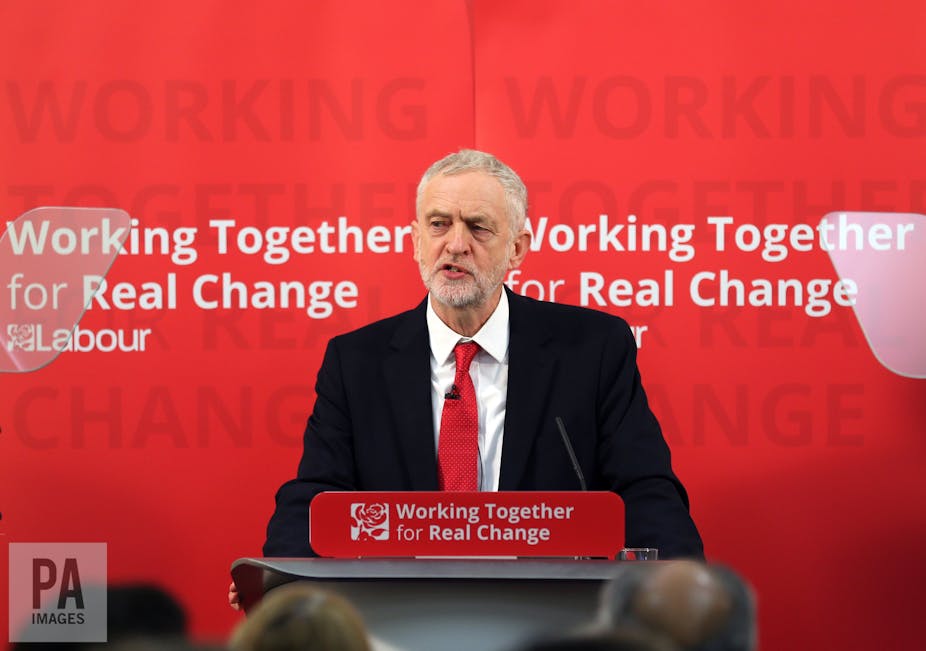For the Labour party, tackling the issue of immigration – and especially EU immigration – has been a back-breaking task. Its record in office has dogged the party, and public concern about large-scale immigration contributed to Labour’s electoral defeats in 2010 and 2015.
Labour is losing its traditional voters to UKIP, and despite official party policy backing the Remain campaign, much of Labour’s traditional electoral base voted to leave the EU. The Parliamentary Labour Party knows this, and prominent backbenchers have been building up pressure on party leader Jeremy Corbyn to step to the right on this issue.
As scholar Jon Curtice observes: “with questions of immigration and identity at its core, the referendum on Britain’s membership of the EU inevitably cut across Labour’s electoral coalition”“. Labour needs to appeal to both its (in crass and simplified terms) lost "leavers” and liberal “remainers” if it is to have any chance of winning the next election.
But appealing simultaneously to the concerns of London voters and the very different interests of voters in the de-industrialised North is a massive challenge. It’s possibly even an insurmountable one. This is the progressive dilemma for Labour. If left unresolved it may result in the party’s demise as a key political force.
Avoiding the issue
Corbyn has remained reticent and fairly ambiguous on his position on immigration in post-Brexit Britain. That ambiguity has frustrated voters, parliamentarians and commentators alike. His first speech of 2017 was meant to bring clarity to his vision but he ended up presenting a contradictory message.
First he claimed he wants the UK to stay in the single market to “protect living standards and jobs”, while at the same time professing that Labour is not “wedded to the principle of freedom of movement”. That’s a problem because it seems increasingly clear that Britain can’t have one without the other.
At the same time, Labour “wouldn’t rule freedom of movement out”, which probably reflects the fact that the party’s stance will be determined by what type of Brexit the government puts forward in March. Nonetheless, if Corbyn was aiming for clarity on Labour’s position on free movement, he hasn’t succeeded.
The biggest statement was that Labour will guarantee the rights of EU citizens already living in Britain. This is the first clear statement on Corbyn’s post-Brexit vision and a commitment that clearly separates Labour from the Conservatives.
Tellingly, within Corbyn’s proclamations about having a reasonable immigration policy, he reiterates that “we cannot afford to lose full access to the European markets”. That suggests that this is Labour’s priority above all else. He proposes that “changes to the way migration rules operate from the EU” should be part of Brexit negotiations. But what that means in practice is anyone’s guess.
On the one hand, it’s nice to finally hear some opposition to Theresa May’s insinuations of hard Brexit. It’s also positive to see Corbyn challenging the government policies that have scapegoated migrants and fuelled anti-migrant sentiment.
On the other hand, Corbyn’s proposals aren’t adding much in the way of meaningful ideas. He isn’t squaring the circle of public anxiety over EU immigration, while maintaining access to the single market.
Adding to the confusion is Corbyn refuting the claim that EU immigration is too high, while at the same time suggesting that his policy solutions “would have the effect of reducing numbers of EU migrant workers in the most deregulated sectors”. Does he think EU immigration is too high or not?
Responding to voters
Corbyn refuses to make “false promises on immigration” – here alluding to the Tories’ failed net migration target. This is wise in terms of learning not to play the numbers game, but could be electorally costly. Voters seem to welcome the Conservatives’ simple net migration policy – flawed and arbitrary as it is.
He instead thinks taking action against the undercutting of pay and conditions, closing down labour loopholes and banning jobs being exclusively advertised abroad are key to appeasing voters’ concerns.

Corbyn’s diagnosis of the public’s anxiety over immigration being ultimately about grievances with the system that does little to serve them may be accurate. But measures to root out the causes of irregular migration, greater employer liability to prevent undercutting and displacement, and investment in infrastructure, housing and public services to appease these grievances are medium to long-term solutions, and ones that the public probably won’t buy in a country where parliaments are short and fixed.
There is little else that was new in this speech – we were reminded that Labour would bring back the Migrant Impact Fund (which the government looks likely to do in any case), and that Labour welcomes international students, which may at least be welcome news for universities in the face of the Conservatives’ persistence with including students in the net migration target.
Corbyn’s policies, if we can call them that, may sound familiar because this is essentially what Ed Miliband proposed. But herein lies the faulty electoral strategy which Labour can’t seem to resist time and again – economic solutions to what is, for most people, a question of culture and identity.
Corbyn’s personal convictions won’t allow him to say that immigration is a problem, but he knows that’s what the vast majority of Labour voters want to hear. To win back those lost Labour voters he will have to come up with more concrete policy solutions to convince them that Labour has workable immigration policies. Ultimately, if Labour is to have a coherent message, it will have to decide which electoral base to privilege.

